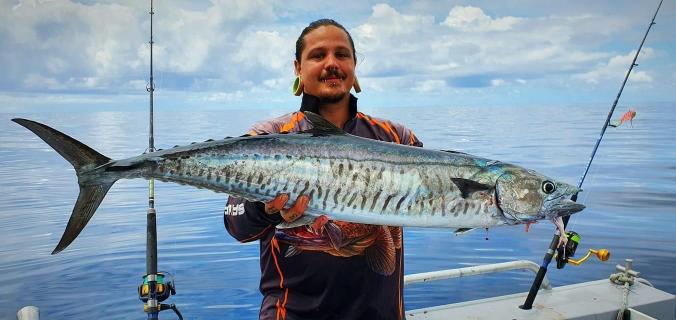
Arthur Gorrie
The Queensland Government has moved to protect fishing jobs and give Queenslanders a say on future management of Spanish mackerel stocks, according to Fisheries Minister Mark Furner.
The Opposition interpretation is that the government has been “dragged kicking and screaming to open consultation,“ after “claims of flawed data collection and significant public backlash“.
Proposed restrictions, now up for public consultation, also include possible new obligations for recreational fishers, including a requirement they report their catches.
Consultation began on Wednesday (6 April), with a government call for “input from recreational and commercial fishers on the management of the spanish mackerel fishery to ensure its long-term sustainability“.
Mr Furner said no decision on the fishery had yet been made and he wanted to hear from all fishers on what management action should be taken.
“The science tells us that Spanish mackerel stocks are at historically low levels, and action is needed to rebuild the stocks of this iconic fish, which is an important commercial species and a way of life for many recreational fishers,” Mr Furner said.
“The recent stock assessment, which has been independently reviewed, concluded the estimated biomass is below the nationally recognised limit reference point level of 20 per cent.
“Doing nothing is not an option and, in line with our Sustainable Fisheries Strategy 2017-2027, management action is required to rebuild the stock to sustainable levels.”
And that is the sticking point. The Opposition claims the science is not sufficiently scientific and the sustainability assessment is based on flawed data.
Mr Furner said possible management actions could include a reduction in recreational and commercial catch limits, an increase in the legal minimum size and closed seasons or areas to protect schooling mackerel.
“We cannot protect the jobs that depend on Spanish mackerel unless we support the recovery of Spanish mackerel stocks,’’ he said.
“If there is no fish, there are no fishing jobs, so I will do everything I can to restore these stocks so these jobs can have a future for decades to come.”
Mr Furner said the government was seeking comments on proposals “to require recreational fishers to report all the Spanish mackerel they keep,“ as occurred in Victoria and South Australia for southern rock lobster and salmon.
Queenslanders wanting to have their say can do so at daf.engagementhub.com.au/spanish-mackerel-2022
Mr Furner said the overwhelming feedback from previous fisheries reforms was that stakeholders wanted reform in Queensland fisheries.
“We will carefully consider all feedback before final decisions are made on management actions ahead of the 2022 fishing season, commencing on 1 July,” he said.
“This is all about sustainability and making sure we have Spanish Mackerel for the future, including the Great Barrier Reef World Heritage Area,“ he said.
Key documents:
– Spanish mackerel stock assessment – era.daf.qld.gov.au/id/eprint/8226/25/Spanish mackerel EC stock assessment report 2021.pdf
– Peer review – era.daf.qld.gov.au/id/eprint/8226/1/East coast Spanish mackerel stock assessment external review 2021.pdf
– Response to the peer review – era.daf.qld.gov.au/id/eprint/8226/31/Spanish mackerel EC response to reviewer 2021.pdf





